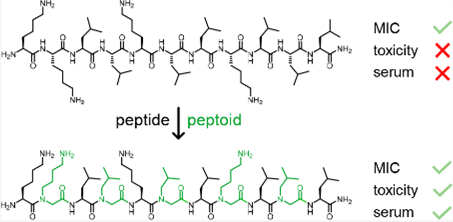Antimicrobial Peptide–Peptoid Hybrids with and without Membrane Disruption

Check out our latest paper Antimicrobial Peptide–Peptoid Hybrids with and without Membrane Disruption in ACS Infectious Diseases!
Abstract
Among synthetic analogues of antimicrobial peptides (AMPs) under investigation to address antimicrobial resistance, peptoids (N-alkylated oligoglycines) have been reported to act both by membrane disruption and on intracellular targets. Here we gradually introduced peptoid units into the membrane-disruptive undecapeptide KKLLKLLKLLL to test a possible transition toward intracellular targeting. We found that selected hybrids containing up to five peptoid units retained the parent AMP’s α-helical folding, membrane disruption, and antimicrobial effects against Gram-negative bacteria including multidrug-resistant (MDR) strains of Pseudomonas aeruginosa and Klebsiella pneumoniae while showing reduced hemolysis and cell toxicities. Furthermore, some hybrids containing as few as three peptoid units as well as the full peptoid lost folding, membrane disruption, hemolysis, and cytotoxicity but displayed strong antibacterial activity under dilute medium conditions typical for proline-rich antimicrobial peptides (PrAMPs), pointing to intracellular targeting. These findings parallel previous reports that partially helical amphiphilic peptoids are privileged oligomers for antibiotic development.
Author(s): Etienne Bonvin, Hippolyte Personne, Thierry Paschoud, Jérémie Reusser, Bee-Ha Gan, Alexandre Luscher, Thilo Köhler, Christian Van Delden, and Jean-Louis Reymond